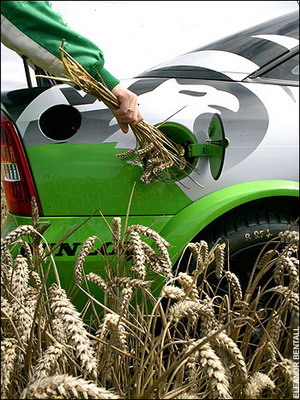Yes, I was one of those people stranded around Europe thanks to a cloud of ashes that no one could see but make brighter reds at sunset. My journey was a 42-hour journey through Europe’s interconnected railway connections, but also an eye-opener on the frailty of globalisation and a living proof that the railway systems of the European countries are not effectively interconnected.
Belgium is a good example. Ongoing works on a track to Liege. No way to get there on time, but with a 15-minute delay. A train loaded with people that are connecting to the Thalis, a high-speed train taking people directly to Paris and Brussels. Two trains leaving at almost the same time we arrive. They hold one for a few minutes and, to the travellers’ consternation, let the other one go. A whole journey ruined because of a three-minute coordination error. Lots of wasted space on the leaving train, lots of upset passengers that need relocation on the station. Belgian management at its worst. Fortunately a compassionate soul understands the disaster they have caused and change my first class tickets to Spain for some piece of paper: a “laisser-passer” (let him pass, a safe-conduct). With it I can sneak into any train, no seat assured, but if there is a seat, I can take it. That was the key to my escape.
A journey away, in Brussels, the Belgian capital, lots of people queuing at the counters. People sitting and standing everywhere. No trains to leave. We manage to sneak into one. Half of the places were free!

Then in Paris. Train workers on strike for the 14th day. No way to get info in Paris Nord. In Paris Lyon we are stopped by some first-attention workers selected, I guess, by their ability to mutter some words in English. Totally unhelpful, there are no spaces in trains for the next three days. Everyone should go home. The poor bastard even doubts that my reservations are authentic and asks me for proof. Amazing.
Next stop at Paris Austerlitz. Instead of flocks of British citizens trying to get their chance as in the last station, this time it’s crowds of Spaniards there trying to get home. No places till Saturday. I manage to talk to a nice guy from the company which tells me something that I’ve already heard a couple of times before: “hold on to that laisser-passer, that’s the best thing anyone can have out there” and then shares some secret with me “there’s going to be some special train service taking people southwards to Toulouse tonight at 21:56 at Paris-Bercy station”.
That was another key moment. The secret train. One of those trains that France has put up in order to help travellers through France.
Paris Bercy. That station does not even appear on the maps. (Just check it, amazing! It’s not Bercy metro station which is in the centre of Bercy, a huge borough) I had to go back to my source and ask for some references. Not even the taxi driver knew where Paris Bercy was. Fortunately and thanks to my confident I knew it was just after crossing the Bercy bridge over the Seine. Once there, there were some sign.
The station is used to transport cars by train. It’s an auto-train station. They have added some passenger wagons to a huge line of car-transporting wagons.

Ten people controlling the entrance, god forbid that some crowd would jump onto the train to get home. I’m sure they would only select the travellers really deserving it, the desperate ones, the children. After all that’s what was in the news: France doing all they can to help expatriates get back home.
Fortunately, my “laisser-passer” worked. They seemed to be impressed by it. I know it’s going to end up hung up somewhere at home. We could board the train… and then we left for Tolouse. I was to share my journey with a lot of refugees, sing songs and share experiences, or so I thought.

Well, you can see the reality. Fortunately there were two people to talk to. The rest of the train was empty. I guess they had a tough time deciding which of those refugees deserved going back home. So they decided not to let anyone go. These are the trains, the special trains, meant to be helping people get back home. And that’s how they go: empty.
There were still a lot of things to come. The 14th day of railway workers strike in France cancelled the following trains I hoped to take and I had to make it in a bus to the Spanish border. There I read again about the special resources countries were providing to help those stranded get back home. Astonishing.
Yes, resources were there, somehow. But totally uncoordinated and wasted. Here lies the proof of the case against European efficiency and how politicians and media speak of things they don’t know about. In the meantime, the non-transported travellers mean loses both for them and the companies they work for, for the airlines and for the whole Europe. Another notch down the economic crisis that is dragging us down.
At the end of the day, the Eyjafjallajökull leaves us with lessons on how the globalisation is frail, too frail. Myself, I should be in India now. Instead I’m at home in Barcelona, and happy to be here by the way. Is the air transportation sector so frail to completely collapse under some ashes? Is the railway transportation system so inept that it just wastes more and more resources while failing to respond in an emergency situation? Why are the politicians lying to us so blatantly about the extra efforts they’ve made to help people get back home? How can railway workers just keep on strike in this situation and Mr. Sarkozy simply do nothing about it?
We are less prepared than we think we are. And we must get ready and push towards open skies and build the next generation of air navigation systems the sooner the better. Also it is necessary to overhaul the whole inefficient European rail transport system.
Experiences. We all learn from them. I also try to. And from one reconforting image, the most positive thing the volcano did (as if telling about our shortcomings wasn’t good enough…) the impressive sunset over the Seine in Paris, the one thing that has improved and turned even more reddish with the Eyjafjallajökull’s ashes.

















